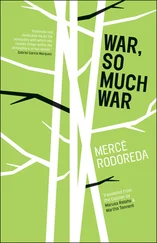Laszlo Krasznahorkai - War & War
Здесь есть возможность читать онлайн «Laszlo Krasznahorkai - War & War» весь текст электронной книги совершенно бесплатно (целиком полную версию без сокращений). В некоторых случаях можно слушать аудио, скачать через торрент в формате fb2 и присутствует краткое содержание. Год выпуска: 2006, ISBN: 2006, Издательство: New Directions, Жанр: Современная проза, на английском языке. Описание произведения, (предисловие) а так же отзывы посетителей доступны на портале библиотеки ЛибКат.
- Название:War & War
- Автор:
- Издательство:New Directions
- Жанр:
- Год:2006
- ISBN:978-0811216098
- Рейтинг книги:5 / 5. Голосов: 1
-
Избранное:Добавить в избранное
- Отзывы:
-
Ваша оценка:
- 100
- 1
- 2
- 3
- 4
- 5
War & War: краткое содержание, описание и аннотация
Предлагаем к чтению аннотацию, описание, краткое содержание или предисловие (зависит от того, что написал сам автор книги «War & War»). Если вы не нашли необходимую информацию о книге — напишите в комментариях, мы постараемся отыскать её.
War and War
War and War
War and War
War and War
War & War — читать онлайн бесплатно полную книгу (весь текст) целиком
Ниже представлен текст книги, разбитый по страницам. Система сохранения места последней прочитанной страницы, позволяет с удобством читать онлайн бесплатно книгу «War & War», без необходимости каждый раз заново искать на чём Вы остановились. Поставьте закладку, и сможете в любой момент перейти на страницу, на которой закончили чтение.
Интервал:
Закладка:
He sat on the bed with his coat in his lap holding a small pair of scissors he had borrowed from his hosts in order to unpick the delicate stitches he had used to secure the top of the secret pocket he had sewn into the lining, so that he might finally extract the manuscript, and was ceremonially about to set about his task, when suddenly, barely audibly, the door opened and the interpreter’s partner stood at the threshold with an open glossy magazine in her hand, not entering but looking across the room, somehow beyond Korin, and hovered there for a moment, more timid and tongue-tied than ever, not looking in the least likely to break her perpetual silence but rather on the point of disappearing once more and beating a hasty apologetic retreat, when finally, perhaps because both she and Korin were equally disconcerted by her unexpected appearance, she pointed to a photograph in the open magazine and asked, very quietly, in English: “Did you see the diamonds?” and when Korin, in his surprise, was unable to emit the merest squeak by way of an answer but continued to sit as if rooted to the spot with the coat in his lap, the very scissors frozen in his hand, she slowly lowered the magazine, turned around, and as noiselessly as she had entered, left the room, closing the door behind her.
The eternal belongs to eternity , said Korin loudly to himself, then, since he had taken a long time entering a single page, he perched on the windowsill holding the second, gazing out at the lights on the fire escapes of the building opposite, scanning the flat desert of the rooftops and the furiously racing clouds in the strong November wind, and added, Tomorrow morning, it must be done by tomorrow.
III ALL CRETE
According to the manuscript’s superbly honed and supple sentences, the kind of craft the ship most resembled was an Egyptian seagoing vessel, though it was impossible to tell what tides had borne it hither, for while the powerful winds currently blowing might have carried it from Gaza, Byblos, Lucca or indeed from the land of Thotmes, it might just as likely have been swept across from Akrotiri, Pylos, Alasiya, and if the storm had raged particularly fiercely, even from the distant isles of Lipari, and in any case, one thing was certain as Korin typed the letters, which was that the Cretans who had gathered on the shore had not only never seen one like it but had not even heard of such a craft, and that was chiefly because, firstly, they pointed out to each other, the stern was not raised; secondly, that instead of a full complement of twenty-five/twenty-five oarsmen, there were thirty/thirty, originally at least, fully equipped; and thirdly, putting all that aside, they remarked as they studied it from the shelter of an enormous cliff, the size and shape of the sail was now in shreds and its extent could be estimated, though the straining ornamental figurehead on the prow and the unusual positioning of the double row of arching tangles of rope all looked unfamiliar, unfamiliar and terrifying, even in the throes of destruction as huge waves drove the craft from Lebena into the bay at Kommos then cast it against a rock, turning the vessel on its side as if to exhibit the broken body to the frightened locals, saving it from further damage and raising it above the foaming waters, introducing it, as it were to human eyes in order to demonstrate how the combination of water and storm could, should it wish to, deal with such a vast mechanism; how thousands of unstoppable waves could toy with this previously unknown, peculiarly constructed ocean-going trader on which everything had died or at least seemed to have died, and had, indeed, to be dead, the Cretans muttered to each other, for surely no one could survive such turmoil in this lethal gale, not even a god, they added from the shelter of the cliff, for, as they said on shore as they shook their heads, no one could remain in one piece under such catastrophic, demonic circumstances, not even a god newly born, for none such could be born.
They are here for eternity , Korin explained to the woman in the kitchen, while she stood at the stove in her usual position with her back to him, stirring something in a pan, and not giving the slightest sign of having understood or given any heed to what she was hearing, and he didn’t go back to his room for the dictionary as he often had done, but abandoning hope of explaining the notion of eternity and here-ness , tried to move the conversation on instead by pointing to the pan in confusion, asking: Something delicious … as usual?
It wasn’t until the next day that the storm had abated to the extent that a small boat from Kommos dared venture out on the waters and row over to the rock, and so it was only then, Korin wrote, once the wind had dropped, early next afternoon, that they discovered that what had seemed from a distance to be a wreck beyond salvaging, was most certainly a wreck, but at a closer view, not entirely beyond salvaging, and the improvised rescue party was astonished to discover three, and maybe even four survivors in one of the main cabins that had not been flooded: three, they signaled by hand to those on the shore, and a possible fourth lashed to this or that post, the four unconscious but certainly alive, or at least three of them were alive and the heart of the fourth was also possibly beating, so they cut these four free of the posts and brought them out, they being the only four for the rest had been engulfed in the flood and drowned, some sixty, eighty or even hundred of them, they said later, who knows how many dreaming their last by the time they found them, but no longer in any position to feel pain, as they put it; while these three, the rescuers said, or maybe even four, had miraculously survived, and so they quickly brought them out of the cabin and transferred them to the boat immediately, one after the other, and set off back again leaving the rest, the entire ship, just as it was, since they knew exactly what would happen, what would come to pass, as, in two days, it did, when a powerful wave broke the by now utterly shattered wreck into two, whereupon it slid off the rock and, suddenly, almost unbelievably quickly, within a few minutes, sank beneath the surface, so that a quarter of an hour later the last of the waves was sweeping smoothly over the place it had been and across the shore where stood the entire village of the small fishing community of Kommos, every man, woman, child and dotard, mute and still, since within a quarter of an hour nothing, but nothing, remained of that huge, strange and terrifying vessel, not even the very last wave, only the three living survivors and a fourth who might survive the catastrophe, four, all in all, out of the sixty, the eighty, the hundred, only four.
In the days of painful recuperation that followed they pronounced their names differently each time so the locals tended to stick to the names they claimed to have heard on the first day, in other words they referred to one as Kasser, one as Falke, one as Bengazza and the fourth as Toót, feeling that this was probably the most correct version, assuming that everyone took it for granted that the four names — names that sounded peculiar to their ears — were merely approximations, and not within hailing distance of the possible originals, though to tell the truth this was the least of their problems, for contrary to their earlier experience of those cast on their shores, those whose names, origins, homelands and fate would bit by bit, and in fact fairly quickly, become plain, with these people everything — names, origins, homelands and fate — became progressively more mysterious, that is to say their foreignness and peculiarity did not diminish but grew in astonishing fashion with the passing of days, so that by the time they were well enough to leave their beds and ventured with extreme caution out into the open air, that moment being described in that wonderful chapter , said Korin, pronouncing the word chapter in English, in particular detail, there stood these perfectly mysterious four men of whom less than nothing was known because they consistently avoided questions put to them in Babylonian, the language —Korin used the English word again — they shared, albeit both sides spoke it only brokenly, by answering to something different, so that even Mastemann, a recent foreign castaway from Gurnia, to the east of the island, a man not much given to doubts but willing to state his opinions forcefully, appeared to be in doubt, yes, even he, Mastemann, fell silent as he watched them from behind the wagon as they strolled silently through the tiny village, as they ambled behind the fig trees and eventually settled down to dawdle in an olive grove and watch the sun decline on the western horizon.
Читать дальшеИнтервал:
Закладка:
Похожие книги на «War & War»
Представляем Вашему вниманию похожие книги на «War & War» списком для выбора. Мы отобрали схожую по названию и смыслу литературу в надежде предоставить читателям больше вариантов отыскать новые, интересные, ещё непрочитанные произведения.
Обсуждение, отзывы о книге «War & War» и просто собственные мнения читателей. Оставьте ваши комментарии, напишите, что Вы думаете о произведении, его смысле или главных героях. Укажите что конкретно понравилось, а что нет, и почему Вы так считаете.












